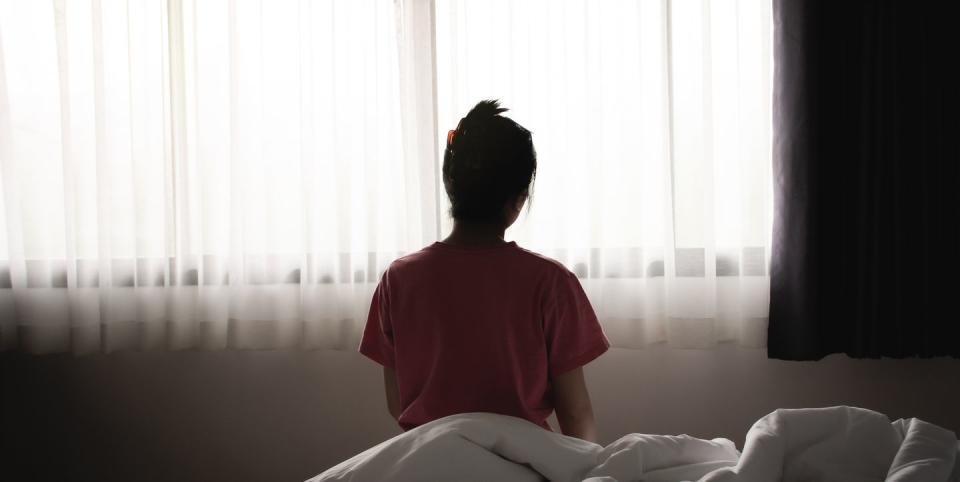How to tell the difference between anxiety and OCD

There's more and more information out there about mental health conditions, but until you receive an official diagnosis, it can all feel quite confusing. With mental health conditions widely reported to have increased during lockdown - to the extent that a recent survey revealed 80% of British people feel working from home has had a negative impact on their mental health - it's important to know exactly what you're dealing with, and see your doctor if you need support.
Seeing an expert is all the more imperative because some conditions - like obsessive compulsive disorder (OCD) and generalised anxiety , disorder (GAD) - can feel similar in some ways, and might be mistaken for one another.
OCD is perhaps most known for causing physical compulsions. But sufferers of the mental disorder can also experience intrusive thoughts, which can be hard to banish. Similarly, when anxiety takes an intense hold, it's tricky to rid the thoughts from your mind. That's where the overlap can come, causing a misunderstanding about what's really going on.
If you suspect you have either generalised anxiety disorder or OCD, but you're not sure which, there are some key differences you need to know about. So we asked Fionuala Bonnar RMN, CPN, BSci, director at Mental Health First Aid England, to explain them. Read her answers and advice below.
What is anxiety?
Anxiety itself is a normal response designed to keep us safe by alerting us to possible dangerous situations and motivates us to solve everyday problems. When we feel anxious, we might notice physical responses (rapid heartbeat, sweating, dry mouth, aches and pains), psychological responses (disturbed sleep, mind racing or going blank, poor memory) and behavioural ones too (avoidance of situations or places, or behaviours such as going back to check you have locked the car/door etc).
"Everyone experiences anxiety at some time. Occasionally feeling anxious, particularly about events or situations that are challenging or threatening, is normal and very common," says Fionuala. "However, if your feelings of anxiety regularly cause significant distress or they start to impact on your ability to carry out normal activities like meeting friends and family or working, it may be a sign of an anxiety disorder."
"There are several different types of anxiety disorders, of which generalised anxiety disorder (GAD) and OCD are two. Some others are panic disorder, PTSD, and some phobias," Fionuala advises. There you have it: generalised anxiety disorder and OCD are two different types of anxiety disorder, so it's no wonder they can feel similar.

What is OCD?
OCD is characterised by the presence of either obsessions or compulsions, but commonly both. These obsessional (or intrusive) thoughts and compulsive behaviours accompany the feelings of anxiety.
"Obsessional thoughts are recurrent thoughts, impulses or images that the person cannot dispel. These thoughts are unwanted and cause marked anxiety in the person," explains Fionuala. "Compulsive behaviours are repetitive behaviours or mental activity. For instance, a common popular concern for those with OCD includes chronic hand-washing. Some people may feel they must wash their hands a certain number of times in order to prevent something from happening. Mental activity can include counting, silently or repeating certain words or phrases internally."
A person with OCD feels driven to behave in this way in order to reduce anxiety about obsessional thoughts.
Although globally OCD is considered a form of anxiety disorder, the USA is no longer classifying OCD as an anxiety disorder. It now has its own category, called 'obsessive-compulsive and related disorders'.
What's the difference between generalised anxiety disorder and OCD?
One key difference lies in the worries themselves. "Those experiencing anxiety without the symptoms of OCD usually worry about things which are strongly based in real-life concerns," says Fionuala. "While the worries may be extreme, the topics a person with generalised anxiety festers over, are appropriate. These topics concern issues such as: health, personal relationships, finances, and work."
Those with OCD, however, find their compulsions start as a way of trying to reduce anxiety caused by their obsessive thoughts, but their behaviour is either excessive or not actually connected to the initial thought. "Most people with OCD realise that such compulsive behaviour is irrational and makes no logical sense, but they cannot stop acting on it and feel they need to do it 'just in case'. Unlike people with OCD, people with anxious thoughts do not typically engage in ritualistic behaviour to deal with their fears," Fionuala explains.

What symptoms overlap between the both generalised anxiety disorder and OCD?
Anxiety itself overlaps, being experienced in both conditions. But the difference, Fionuala says, is that "in OCD it is a contributor to the condition, and in generalised anxiety disorder, it is the impact."
"In most cases, individuals with OCD feel driven to engage in compulsive behaviour and would rather not have to do time consuming and torturous acts. This compulsive behaviour is done with the intention of trying to escape or reduce anxiety or the presence of obsessions." For this reason, asking a person with OCD to stop can be unhelpful.
Subscribe to Red now to get the magazine delivered to your door. Red's latest issue is out now and available for purchase online and via Readly or Apple News+.
Like this article? Sign up to our newsletter to get more articles like this delivered straight to your inbox.
You Might Also Like

 Yahoo Finance
Yahoo Finance 
